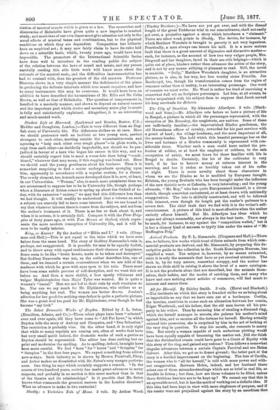The City of Sunshine. By Alexander Allardyce. 3 vole. (Black-.
wood and Sons.)—Mr. Allardyce sets before us here a picture of life in Bengal, a picture in which all the personages represented, with the exception of Mr. Eversley, the magistrate, are natives. Some of these are sufficiently familiar,—the impoverished libidos gentleman, the old Mussulman officer of cavalry, rewarded for his past services with a grant of land ; the village headman, and the most important of all, the money-lender. The hold which this baneful personage has on the lives and fortunes of a Hindoo community is represented with con- siderable force. Whether such a man could have united the pro- fession of robber, or at least the employer of :robbers, to the safe occupation of usury, we must leave for those familiar with life in Bengal to decide. Certainly, the lot of the cultivator is very hard, if he has to borrow money at ruinous interest in the morning, and has it stolen or forcibly taken out of his coffer
at night. There is more novelty about those characters in whom we see the Hindoo as he is modified by European thought. Krishna, the young Brahmin who has been brought under the influence of the new theistic sects at Calcutta, is very interesting ; and the young advocate, " Mr. Roy," who has quite Europeanised himself, is a clever sketch, though somewhat caricatured, or at least drawn with unfriendly exaggeration. The tale is skilfully constructed, and will be followed with interest, even though its length put the reader's patience to a severe test. The chief fault that we find with it is the writer's self- consciousness. A picture of this kind is most effective when the author entirely effaces himself. But Mr. Allardyce has ideas which he urges not always seasonably, nor always in the best taste. There may be much, for instance, to say against the " competition wallah," but it is but a clumsy kind of sarcasm to typify him under the name of "Mr Muffington Prig."


































 Previous page
Previous page